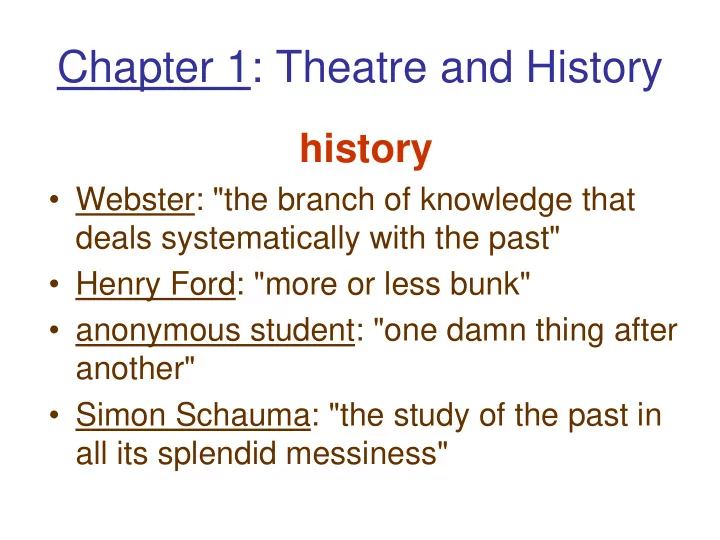

Chapter 1: Theatre and History history • Webster: "the branch of knowledge that deals systematically with the past" • Henry Ford: "more or less bunk" • anonymous student: "one damn thing after another" • Simon Schauma: "the study of the past in all its splendid messiness"
Chapter 1: Theatre and History historiography • “the study of historical methods”
Chapter 1: Theatre and History historia • the ancient Greek word for “questioning” • i.e. research (into the past) • a term coined by Herodotus • part of the Ionian Revolution • which embraced a search for the “elements” which underlay all being
Chapter 1: Theatre and History historians • are like scientists • dig for new data in mounds or libraries • but cannot repeat an experiment • in that regard, historians are more like detectives than scientists • they look for “evidence”
Chapter 1: Theatre and History evidence • is the basis of all historical study • must be put into context, especially when the data are conflicting • thus, historians are less like scientists or detectives than lawyers arguing a case
Chapter 1: Theatre and History primary evidence • the principal type of historical evidence • in its most basic form, the contemporaneous accounts of eye- witnesses to some historical event
Chapter 1: Theatre and History secondary evidence • second-hand accounts gleaned from others’ recollections of past events • considered a lesser form of data • the distinction between primary and secondary evidence lies at the heart of many historical controversies • e.g. Antigone 905-915
Chapter 1: Theatre and History inference • “connecting the dots” • allows the creation of a larger picture from a small body of data • but also admits bias and distortion • relies on what is compelling or cogent to the historian’s readership • can turn historical scholarship into a “popularity contest”
Chapter 1: Theatre and History tripartition • the Indo-European proclivity for seeing triads or “threes” – “Ready, Set, Go!” – the story of the Three Bears – “Three strikes, you’re out!” • to us, when someone produces three examples, that confirms a case • an example of Indo-European bias
Chapter 1: Theatre and History Battle of Thermopylae • a battle in the Second Persian War (481- 479 BCE) • a few Greeks hold off the whole Persian army for several days but in the end they all die • Herodotus in The Histories pitches this as a moral victory
Chapter 1: Theatre and History Ibn Kahldun • an Islamic historian and philosopher who outlines seven fallacies of history – partisanship to a creed or opinion – overconfidence in one’s source – failure to understand the intention of a source – mistaken belief in the truth of a source – failure to place an event in context – desire to gain the favor of superiors – ignorance of the laws governing society
Chapter 1: Theatre and History the worst of history • but to what extant can a historian make things up entirely? • historians are bound by the data and any eye-witnesses to the event
Chapter 1: Theatre and History the best of history • thus to some extent, history must encompass the truth • and good history encompasses more truth than bad history does • and all good history involves the pursuit of truth
Chapter 1: Theatre and History theatre • S. Johnson: “an echo of the public’s voice” • Shakespeare: “a mirror” • Giraudoux: “a trial” • Farquhar: “a banquet” Like hungry guests, a sitting audience looks: Plays are like suppers; poets are the cooks: The founder’s you: the table is this place: The carver’s we: the prologue is the grace. Each act a course, each scene a different dish . . .
Chapter 1: Theatre and History theatron • in ancient Greek literally, “an instrument for viewing” • i.e. the seats • not the stage or orchestra or parodoi !
Chapter 1: Theatre and History theatre • John Cage: “theatre takes place all the time wherever one goes” • Bernard Beckerman: theatre happens whenever “one of more human beings, isolated in time and/or space, present themselves to another or others” • Patti Gillespie: “performances by living actors that take place in the presence of living audiences”
Chapter 1: Theatre and History institution • according to Oscar Brockett, theatre is an “autonomous activity” • versus what is merely “ theatrical ” • but who’s to differentiate between theatre and the theatrical? • especially in a foreign or past culture! • what are the “elements” of theatre?
Chapter 1: Theatre and History elements of theatre • language : versus movement in dance, song in opera • impersonation : versus rules in a game, teaching in a classroom • audience : or, better, “viewers” – n.b. there is a theatre for the deaf, but no theatre for the blind
Chapter 1: Theatre and History theatre history • the “inquiry” into “instruments for viewing”? • the fatal allure of positivism • is there measurable “ progress ” over time? • are we as a species ascending from a primitive state to modern enlightenment? • cf. E.K. Chambers and the “progress” of medieval drama
Chapter 1: Theatre and History chorus • cf. the use of the chorus in later Greek tragedy: tedious archaism or tonic bringing new and constant joy? • is the Greek chorus a “primitive” element in classical tragedy? • we must look for “evolution,” as opposed to “progress”!
Recommend
More recommend